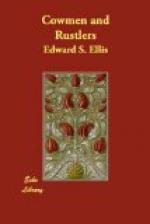The night was well advanced, but their horses had done comparatively little travelling and were capable of a good deal more. The captain took the lead, holding only occasional converse with his men as he swung along at an easy pace; but he, like the rest, was on the lookout for danger, which was liable to approach from any point of the compass.
A marked change showed itself in the temperature. The weather, as will be remembered, had been unusually mild earlier in the evening, but it now became sharp and chilly, as though the breath from the snowy mountain crests was wafted down upon them.
In a valley-like depression, an hour later, where there was an abundance of grass, beside a flowing stream of water, the party went into camp, with a couple of their number on guard, just as they would have done if in a hostile country—which in point of fact was the case.
The night passed, however, without any disturbance, and all were astir before sunrise. The men were provided with several days’ rations, while the succulent grass afforded the animals all the food they needed, so there was no trouble on that score.
Capt. Asbury and Monteith Sterry mounted their horses and rode to the crest of the nearest elevation, which was fully 100 feet in height and commanded a wide sweep of country. The morning was clear and bright, and the first glance they cast to the northward revealed a stirring sight. A horseman was less than a half-mile away, and riding at headlong speed, as if in the extremity of mortal fright.
“What can it mean?” asked the puzzled leader; “no one is pursuing him, and I see no cause for his panic.”
“I suspect,” replied Sterry, thoughtfully, “that he is a messenger bringing important tidings to you.”
CHAPTER XXII.
Important tidings.
It seemed strange that the messenger, if such he was, should know the right course to follow in order to reach the camp of Capt. Asbury, for he was riding directly toward it, and that, too, at the highest speed of which his horse was capable.
But Monteith Sterry had noted a fact which escaped the captain, though he was an observant man. The horseman was not approaching the camp at the moment the couple reached the crest of the elevation and began scrutinizing the surrounding country; he was going at right angles to it, but (as it afterward proved) he carried a glass, with which, at that moment, he was also scanning the horizon for something he was very anxious to find.
Fortunately he caught sight of the couple, and though he could not be assured of their identity at so great a distance, the suspicion of the truth as to Capt. Asbury caused him to put his animal to his best speed.
In a brief time he rode up. While some rods away he recognized the captain and saluted him. A little nearer approach and he identified Sterry, who was astonished beyond measure to discover that he was his old friend, Dick Hawkridge, toward whose ranch he had ridden on the preceding evening.




